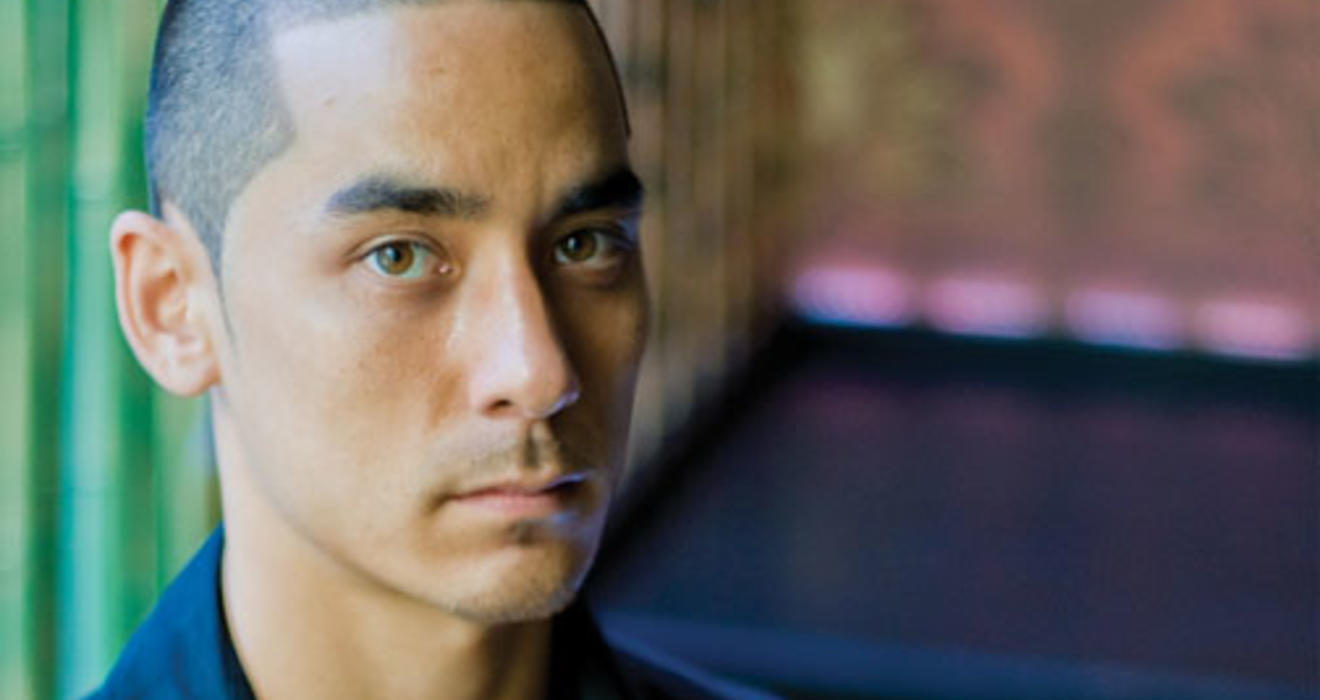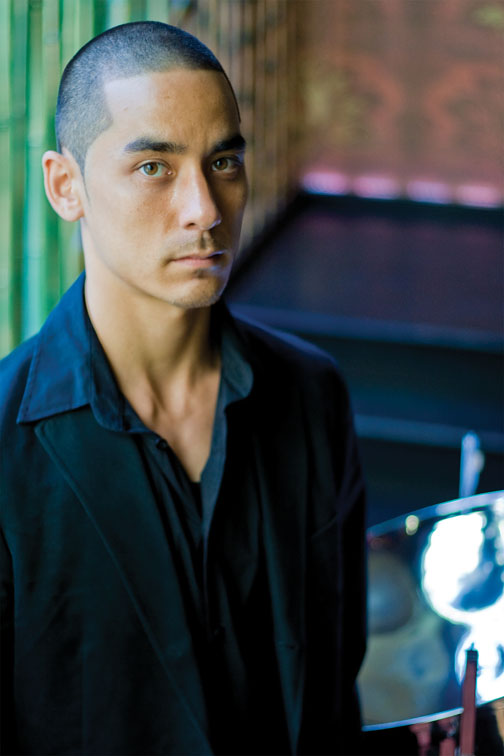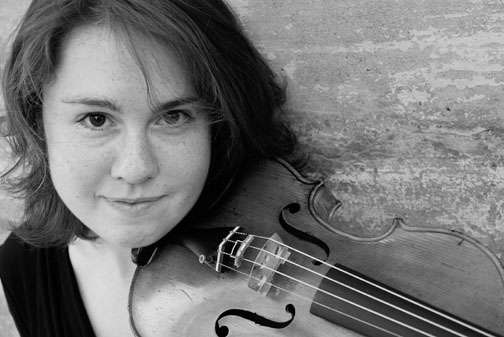
Andy Akiho’s forays into musical composition began with the steel pan. A percussionist since his older sister introduced him to a drum set at the age of 9, Akiho first tried the steel pan as an undergraduate at the University of South Carolina. He was intrigued. After college, he took several trips to Trinidad to learn and play the music, and soon he began writing his own pieces.
Akiho wanted to extend the steel pan into American jazz and contemporary classical music. A composer friend suggested that he return to school to meet classical musicians who were interested in breaking through boundaries of their own. So he auditioned for and won a spot in the contemporary-music program at the Manhattan School of Music, which led to a master’s degree from Yale, which led to what he is today: a second-year Ph.D. student in musical composition at Princeton who already has won major commissions and competitions. The New York Philharmonic premiered one of his compositions in December 2012.
He sometimes changes the sound of the steel pan by playing it with chopsticks, rubber bands, magnets, and plastic tubes, and melds its timbres with more traditional Western instruments and ensembles, including the string quartet. The 33-year-old composer believes there’s a desire among performers and audiences to hear “unique and exotic sounds and combinations of instruments.”
Akiho’s willingness to do the unexpected makes him an ideal — and in many ways, typical — member of Princeton’s graduate program in composition, one of the smallest and most competitive programs at the University. Fellow student Kate Neal began her musical career playing the recorder and piano in a small town in Australia, earned a bachelor’s degree in performance in early-music instruments, and began composing seriously in her early 20s. Recent works incorporate more theatrical elements, including dance, light, and design. Israeli-born Gilad Cohen — whose prize-winning works have been performed around the world — grew up playing classical piano before taking up guitar and bass and co-founding a band influenced by jazz, progressive rock, klezmer, and other world music; he now composes chamber music, writes choral arrangements, and is working on a full-length musical.
“It’s a generation of eclecticism,” Cohen says.
Such musical omnivorism is the composition program’s specialty, says composer Steven Mackey, chairman of the music department. It’s what attracts between 100 and 150 applicants per year for a mere four spots. There are no required courses or lessons; instead, students sign up for ungraded seminars whose topics change from year to year. The students schedule meetings with professors as they see fit to discuss works in progress.
Students are expected to produce at least one composition each year to be performed on campus through the Composers Ensemble, which brings performers, often from New York or Philadelphia, to present the work. Ph.D. candidates also must complete a substantial composition and an unrelated dissertation of between 80 and 200 pages. Cohen, for example, is writing his dissertation on the structure of the longer songs by the British rock band Pink Floyd.
The program is not for beginners: Though students occasionally are admitted straight from college, most are older, some with festival experience and previous commissions, and all are “quite accomplished and experienced,” says Barbara White, a Princeton professor of music.
She describes the students’ compositions as “contemporary concert music.” They may be informed by anything from Stravinsky to the sounds of nature to electronic dance music, but “whatever their interests and experiences, all our composers study the Western classical music tradition,” including the grammar of tonal music, the use of notation, and the history of the canonical classical composers, she says. “So, we continue that tradition, but we also contest and reshape it.”
One way student composers are doing that is by using technology to create new sounds and incorporating other art forms, such as film and dance, into their works. The graduate students have written most of the pieces for PLOrk, the Princeton Laptop Orchestra. For each piece of music, new “instruments” are created with computer code that generates sound, projected through custom speakers and controlled in various ways.
Students increasingly are reaching beyond music into other creative spheres, either by themselves or in conjunction with others. They’re “more likely to see themselves as artists, not solely as composers,” says White, whose work includes collaborations with choreographers and video artists, as well as video works she’s done on her own.
Compositions by Neal, a fourth-year Ph.D. candidate, are awash in elements of theater. Her 2006 work “Concave City” — subtitled “A love story between two cars” — begins as two Toyota Cressidas roll onto the cobblestone floor of the North Melbourne Meat Market, a large, open community space. (Neal told an interviewer that she wants to “break down that perception of classic concerts being in concert halls,” and so some of her works are performed in warehouses and other nontraditional venues.) The cars’ lights blink, horns honk, and two dancers cavort before they are consumed in a burst of light in a car’s trunk — “like a scene from Repo Man,” said a review in The Australian. Neal gets credit for composing and “devising” the piece, and worked with a choreographer.
In a newer piece, “Semaphore,” dancers spell out SOS with flags, while percussionists play the same message in Morse code. The musicians are not merely accompanying the dancers — they are at the center of the stage as essential participants in the performance, playing their instruments and even moving their heads in perfect unison. The work explores “encoded methods of communication,” Neal explains.
Neal says non-musicians such as choreographer Pina Bausch, architect Daniel Libeskind, and playwright/actor/ director Robert Lepage are big influences. “We’re such a visually inspired culture” that it’s hard not to be interested in how things look as well as how they sound, says Neal, who also has written music for animated short films.
Princeton’s embrace of different influences is a draw for artists like Neal. A major force in the establishment of the composition doctoral program — one of the first in the country — in 1961 was Professor Milton Babbitt *92, the mathematics-influenced composer who died in January 2011. For years the music department was known for Babbitt’s brand of “cerebral music” that “forced listeners to carefully follow his structurally complex compositions,” the University’s obituary said.
While that approach was cutting-edge at the time, things have changed over the years, reflecting what was going on outside academia. Concert music “should reveal and be proud of all the music you love,” says Mackey — whether it’s Chopin, Shostakovich, or a “guilty pleasure” like rock music. Mackey reminds students that Mozart was influenced by the vernacular music of his day, such as Austrian and Italian folk music and Turkish military marches.
Another barrier also has been falling: the separation between composer and performer. That schism also would sound strange to Mozart or Beethoven, but it took hold in the middle of the last century, born of the modernist notion that a piece of music could be perfected only when performed by the most accomplished musicians, explains music professor Dan Trueman *99, the department’s director of graduate studies. “That notion that the composer shouldn’t perform, or the performer shouldn’t compose, has mostly disappeared, and our program reflects that,” he says.
Most students who go through Princeton’s composition program these days also perform. When deciding between two candidates with stellar composing credentials, “we always opt for the person who gets his or her hands dirty” by performing on stage, Mackey says: Audiences are interested in hearing composers play their own work, and orchestras relate to the composers more intensely. A “sense of drama and pacing [is] born out of experience communicating one’s music in real time in physical space,” he says.
Third-year student Caroline Shaw — who started playing the violin at age 2 and singing soon afterward — long focused on performance; studying at Rice and Yale, she figured she would be a baroque violin specialist. All along, though, she was composing on the side. Now she writes primarily for string instruments and for voice — including the vocal octet of which she’s a member, Roomful of Teeth.
What’s next for Princeton’s composers? Many major orchestras are ailing and classical music radio stations are leaving the airways. But it’s not as grim as it might sound, suggests Trueman: He sees the composing world increasingly focusing on smaller, boundary-blurring ensembles, which are thriving. “The number of new and not-so-new groups that are committed to new music and performing at an extraordinarily high level has exploded,” he says. Meanwhile, software makes it possible to create compositions on a laptop, MP3 files can be swapped instantly across the globe, and virtual communities are built around the once-obscure musical instruments or styles.
Still, making a living on commissions alone is difficult, says White. Some composers fill in the gaps by teaching. Composer Judd Greenstein, who left campus several years ago and is finishing his Princeton dissertation, divides his time between his commissions and his work with New Amsterdam Records, which he co-founded in 2007, and its parent New Amsterdam Presents, a nonprofit artists’ service organization.
New Amsterdam, which has released 39 albums, is run out of Brooklyn, where it has become central to an “indie classical” scene devoted to new music. It’s not easy. “I think someone would have to be pretty naïve to get into the art or music world with any dreams of it being a lucrative profession,” says Greenstein.
Current students have a sense of possibility about a 21st-century composer’s life. They appreciate what Princeton is giving them: the chance to get feedback from extraordinary musicians, to explore new types of music, to be part of a strong musical community and have financial support while they’re doing it.
So while Andy Akiho may have come to campus with a suitcase full of commissions, press clippings, and awards, his most interesting work likely is still ahead. “All the things I’m learning now,” he says, “you’ll see them in three or four years.”
Katherine Hobson ’94 is a freelance writer based in Brooklyn, N.Y.








No responses yet